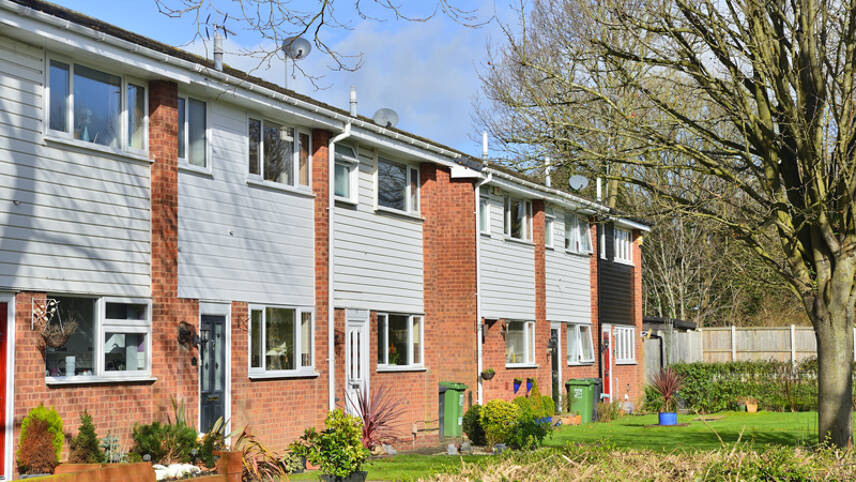Register for free and continue reading
Join our growing army of changemakers and get unlimited access to our premium content

Around 130,000 social and low-income homes across England are set to receive funding. Stock image
The funding is being made available through two existing ‘Help to Heat’ schemes – the Home Upgrade Grant (HUG) and the Social Housing Decarbonisation Fund. HUG is receiving up to £700m and the remaining £800m will be allocated to the Social Housing Decarbonisation Fund.
HUG provides money from Government coffers to local authorities, which are then required to use it to invite households to book in for replacements to their heating systems and wall and roof insulation. To apply for HUG, homes should not be connected to the gas grid and should have an EPC rating of D or lower. In this way, the scheme is targeted at those most of risk of poor health due to poorly heated homes.
HUG was first announced in early 2021 and the initial funding round, of £67m, was made earlier this year. In total, the Government has pledged to provide at least £950m for HUG.
The Social Housing Decarbonisation Fund, meanwhile, provides funding to social housing providers looking to bring numerous existing properties to EPC band C or higher. Funding can be used to fit insulation, replace windows and install technologies like heat pumps and solar panels. Housing providers are asked to match the funding provided by Whitehall.
Homes to have already benefitted from the Fund are saving an average of £400 on their annual energy bills.
Currently, around 46% of the UK’s housing stock is meeting EPC C or above, compared to just 9% in 2008. The amount of social housing meeting this requirement has risen by 18% to 66% in the same timeframe, according to the Government.
Business and Energy Minister Lord Callanan said: “The cheapest form of energy is the energy we do not use. Our Help to Heat schemes are already bringing real benefits to tens of thousands of low-income households across the country by improving the energy performance of their homes and saving them hundreds of pounds on their bills.”
Energy price interventions
The announcement comes after the Government intervened, earlier this month, to cap domestic energy prices below the October price cap originally proposed by regulator Ofgem. Ofgem had planned a price cap increase to £3,549. Instead, the Government has frozen it at £2,500 from 1 October 2022, for two years. Energy companies will be paid the difference by the Government.
Also launched was an energy bill relief scheme for businesses, meaning that they will pay the same price per unit of electricity and gas as domestic energy users. For many organisations, this represents a 40-50% reduction in bills..
While the freezes were welcome, many key figures across the green economy have expressed disappointment that the Government was opting for a short-termist approach and warned that the problem will likely persist without a national energy efficiency scheme open to a broader range of homes and other buildings. The Conservative Party is yet to propose an alternative to the failed Green Homes Grant and has not stated an intention to do so.
Green economy reaction
Responding to the funding round, Ashden’s cities manager Cara Jenkinson said: “We are pleased that the government has recognised that retrofitting low-income homes at scale, starting now, will help some struggling families to better withstand the onslaught of skyrocketing energy bills. However, there is a real danger this money will lie unused. That is because we currently don’t have the workforce to do the work. We must urgently train thousands of UK retrofitters to ensure this new funding can be used rapidly and efficiently, by rolling out a comprehensive retrofit skills strategy.
“Also, £1.5bn is not enough, and it’s not new money. For example, it includes £700 million already announced for the HUGin February this year, an amount way below the £2.5bn promised in the Tory manifesto, which said it would commit an overall £9.2bn to energy efficiency and low carbon heat.”
Schneider electric’s vice-president for home and distribution in the UK and Ireland, Nico Van De Merwe, said: “The latest government scheme to help reduce fiscal pressures for low-income households across the UK is a vital step towards ensuring that the most vulnerable in our society are taken care of in the lead up to winter. Energy efficiency must be accessible to all, especially when the benefits of such can drastically reduce household bills and bolster the health of our planet.
“Today, on average, 86% of energy is used on heating and hot water alone. Therefore, as a short-term solution, we must continue to give greater support to help the adoption of these fundamental home solutions, like smart heating systems and heat pumps. In the long term, we want to see a rollout of home energy management systems as these can help save up to 50% on energy costs. Housing developers, local authorities, housing associations and businesses must work closely together to build energy-efficient homes that are more economical and sustainable for residents, without compromising on comfort.”


Deja Vu
Has this not been attempted 3 times already with £millions of tax payer money being squandered by using cowboy contractors and con artists. I got cavity wall insulation installed for half price. Five years later the condensation has ruined the brickwork. I now get phone calls from more cowboys offering to fix it. Probably funded by another Gov funded scheme.